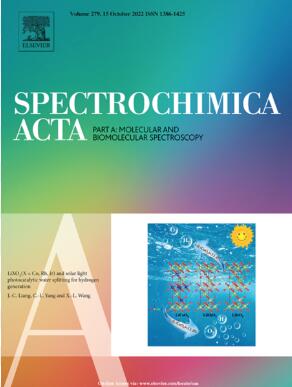结合分子印迹技术的柔性 Au@Ag/PDMS SERS 印迹膜用于 MC-LR 的选择性检测。
IF 4.3
2区 化学
Q1 SPECTROSCOPY
Spectrochimica Acta Part A: Molecular and Biomolecular Spectroscopy
Pub Date : 2024-11-03
DOI:10.1016/j.saa.2024.125393
引用次数: 0
摘要
本研究通过种子介导生长过程制备了核壳结构双金属纳米立方体 Au@Ag NCs。通过三相边界自主组装技术,在界面上实现了 Au@Ag NCs 的阵列结构。利用聚二甲基硅氧烷(PDMS)作为柔性载体,通过简单的 "粘贴 "方法,将阵列结构毫不费力地转移到 PDMS 膜上,从而绕过了对刚性基底的需求。这样就得到了一种具有阵列结构的高柔性透明 SERS 基底(Au@Ag NCs/PDMS 膜,AAP)。为了提高实际样品的选择性检测性能,在膜表面涂覆了分子印迹聚合物(MIPs)以制备印迹膜(Au@Ag NCs/PDMS-MIMs, AAP-MIMs)。结果表明,AAP-MIMs 具有很高的 SERS 灵敏度、稳定性和均匀性。此外,这种柔性基底还具有值得称赞的机械强度,有助于检测不规则表面上的分析物。总之,这种基底有望用于现场检测和分析特定目标物质。本文章由计算机程序翻译,如有差异,请以英文原文为准。

Flexible Au@Ag/PDMS SERS imprinted membrane combined with molecular imprinting technology for selective detection of MC-LR
In this study, a core–shell structured bimetallic nano-cube, Au@Ag NCs, was prepared by seed-mediated growth procedure. The array structure of Au@Ag NCs was achieved at the interface through the autonomous assembly technique at the three-phase boundary. Employing polydimethylsiloxane (PDMS) as a flexible carrier, the array structure was effortlessly transferred to the PDMS membrane, bypassing the need for rigid substrates through a simple “pasting” method. This yielded a highly flexible and transparent SERS substrate with an array structure (Au@Ag NCs/PDMS membrane, AAP). In order to promote the selective detection property to the practical samples, molecularly imprinted polymers (MIPs) were coated on the surface of membrane to prepare the imprinted membrane (Au@Ag NCs/PDMS-MIMs, AAP-MIMs). It was demonstrated from the results that the AAP-MIMs exhibited high SERS sensitivity, stability, and uniformity. Furthermore, the flexible substrate possessed commendable mechanical strength, and facilitated the detection of analytes on irregular surfaces. In summary, this substrate held promising potential for practical on-site detection and analysis of specific target substances.
求助全文
通过发布文献求助,成功后即可免费获取论文全文。
去求助
来源期刊
CiteScore
8.40
自引率
11.40%
发文量
1364
审稿时长
40 days
期刊介绍:
Spectrochimica Acta, Part A: Molecular and Biomolecular Spectroscopy (SAA) is an interdisciplinary journal which spans from basic to applied aspects of optical spectroscopy in chemistry, medicine, biology, and materials science.
The journal publishes original scientific papers that feature high-quality spectroscopic data and analysis. From the broad range of optical spectroscopies, the emphasis is on electronic, vibrational or rotational spectra of molecules, rather than on spectroscopy based on magnetic moments.
Criteria for publication in SAA are novelty, uniqueness, and outstanding quality. Routine applications of spectroscopic techniques and computational methods are not appropriate.
Topics of particular interest of Spectrochimica Acta Part A include, but are not limited to:
Spectroscopy and dynamics of bioanalytical, biomedical, environmental, and atmospheric sciences,
Novel experimental techniques or instrumentation for molecular spectroscopy,
Novel theoretical and computational methods,
Novel applications in photochemistry and photobiology,
Novel interpretational approaches as well as advances in data analysis based on electronic or vibrational spectroscopy.

 求助内容:
求助内容: 应助结果提醒方式:
应助结果提醒方式:


